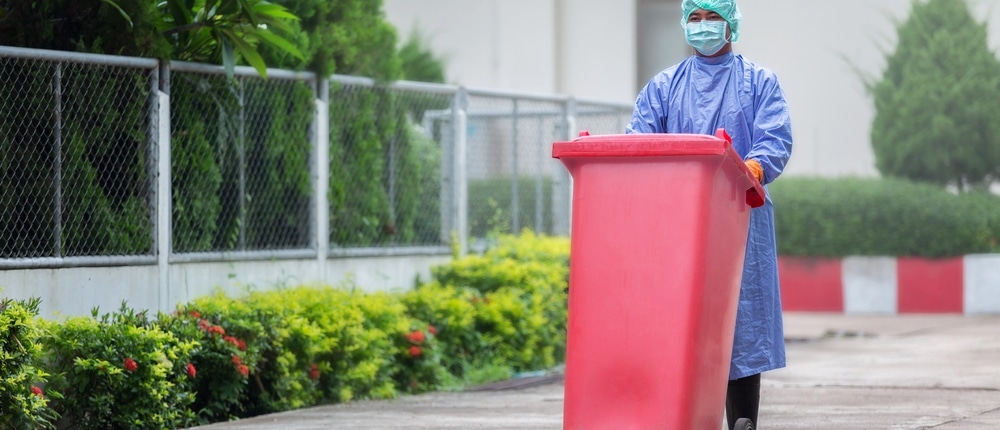
5 Benefits of Proper Hospital Waste Disposal
Proper hospital waste disposal is important for many reasons from protecting public health and the environment to keeping your patients and coworkers safe. It also protects your healthcare facility from fines and a bad reputation. The World Health Organization (WHO) has made a huge effort to encourage proper hospital waste disposal around the world. The WHO lists these key facts about medical waste:
- Of the total amount of waste generated by health-care activities, about 85% is general, non-hazardous waste.
- The remaining 15% is considered hazardous material that may be infectious, toxic or radioactive.
- Every year an estimated 16 billion injections are administered worldwide, but not all of the needles and syringes are properly disposed of afterwards.
- Open burning and incineration of health care wastes can, under some circumstances, result in the emission of dioxins, furans, and particulate matter.
- Measures to ensure the safe and environmentally sound management of health care wastes can prevent adverse health and environmental impacts from such waste including the unintended release of chemical or biological hazards, including drug-resistant microorganisms, into the environment thus protecting the health of patients, health workers, and the general public.
Here are the five major benefits of proper hospital waste disposal:
1. Compliance
The most basic benefit of proper hospital waste disposal is compliance with state and federal regulations. The Center for Disease Control, OSHA, the United States Environmental Protection Agency, and Federal and State legislature all impose certain laws and regulations on the treatment of hospital waste. Compliance with all of these regulations is necessary for medical facilities to stay above board.
Unfortunately, all too often, the temptation to save time and money leads to healthcare facilities skimping on proper hospital waste disposal. The penalties for non-compliance are no joke.
2. Environmental Impact
Poor management of hospital waste can lead to contamination of water and wildlife habitats. National Geographic explains that, “Runoff is a major source of water pollution. As the water runs along a surface, it picks up litter, petroleum, chemicals, fertilizers, and other toxic substances. From California to New Jersey, beaches in the U.S. are regularly closed after heavy rainfall because of runoff that includes sewage and medical waste.” Toxic hospital waste can cause harm to humans, animals and plants if not disposed of properly. National Geographic describes how this happens, “The waste can harm humans, animals, and plants if they encounter these toxins buried in the ground, in stream runoff, in groundwater that supplies drinking water, or in floodwaters, as happened after Hurricane Katrina. Some toxins, such as mercury, persist in the environment and accumulate. Humans or animals often absorb them when they eat fish.”
3. Reduced Risk To Patients And Employees
Hospital waste management is something that can often be taken for granted, but the benefits of a good hospital waste system are numerous, including peace of mind and trust for both patients and employees. Exposure to infectious materials, needle sticks and other dangerous conditions is the result of poor hospital waste management. The World Bank lists advantages of proper hospital waste disposal including that it:
- Helps control nosocomial diseases (hospital acquired infections), complementing the protective effect of proper hand washing;
- Cuts cycles of infection; and
- Easily and cost-effectively addresses health care worker safety issues, including reducing risk of needle sticks;
4. Positive Impact On Public Health
Hospital waste accumulates in huge quantities every day. If it is not disposed of properly, the public health impact could be disastrous. According to the World Bank, good healthcare waste management practices can:
- Control zoonoses (diseases passed to humans through insects, birds, rats and other animals)
- Avoid negative long-term health effects; eg, cancer, from the environmental release of toxic substances such as dioxin, mercury and others.
- Prevent illegal repackaging and resale of contaminated needles;
- Dramatically reduce HIV/AIDS, sepsis, and Hepatitis transmission from dirty needles and other improperly cleaned/disposed medical items;

5. Efficiency
“Healthcare waste management (HCWM) is most effective when proper methods are employed at each step, from planning and procurement through disposal. The first step should be determining realistic options for HCWM given the budget, technology, and local community preferences. Different aspects of health care waste must be considered when choosing the appropriate treatment technology (such as volume, temperature, whether the waste is liquid or solid, hazardous or infectious),” explains the World Bank. In the United States, we are fortunate to have many resources and choices when it comes to hospital waste management and disposal. Secure Med is the best choice in the greater Birmingham and Huntsville areas for complete, compliant, reliable medical waste disposal. Contact us today for a free quote and see how we can help you take advantage of these benefits!







